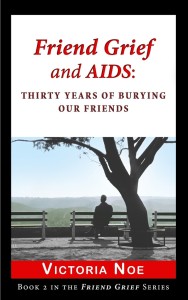Friend Grief and AIDS
Apr 23, 2013 by Victoria Noe, in ACT UP
, AIDS
, AIDS Quilt
, Friend Grief
, Friendship
, Grief
, LGBTQ
, Names Project
I always knew that one of the books in the Friend Grief series would address the AIDS epidemic. Like many who lived through those early years, it was something that shaped my life. It was, I believe, close to the experience of being in in a war. At least, that’s how it felt.
Available now on Kobo, Amazon, IndieBound and Barnes & Noble
I wasn’t sure what my focus would be for the book. There are already many incredible books about AIDS and ACT UP and the Names Project and other aspects of that time. But I quickly realized that the role friends played, especially in the early years, was critical.
We knew we were needed, that we were depended upon to take up the slack for disapproving families and an indifferent government. But writing this book revealed the stark truth that friends were – and still are – responsible for turning the tide. Friends were caregivers, advocates and much, much more. Some famous, most anonymous, all were people whose dedication meant the difference between life and death.
Friend Grief and AIDS: Thirty Years of Burying Our Friendsis now available as an ebook. Like the first book in the series, it’s not long. If you’re of a certain age, you’ll find yourself nodding in remembrance. If you’re younger, you may be shocked by what you read, but I guarantee, it’s all true.
AIDS is not over, not by a long shot. The numbers and attitudes may shock you, but don’t let them cause you to turn away. Instead, let them serve as a wake-up call: to renew your efforts to educate and advocate so that a real cure can someday be found. And let it also remind you to keep your friends close.
Here’s an excerpt:
We are a very judgmental society, at least here in the US, and that mindset often permeates even our own families. It wasn’t just the disease itself that led families to turn their backs. It was the added stigma of homosexuality (or prostitution or drug abuse). The diagnosis was considered a reflection on the family, a bad one. So many felt justified in abandoning one of their own.
We are quicker to blame victims of disease than the disease itself. We believe ourselves superior in some way to people who are sick because we judge them to be stupid, weak or morally deficient. We feel especially good about ourselves when we can quote Bible verses or local laws to support our position.
Different diseases carry their own stigma. Diagnosed with lung cancer? Well, you shouldn’t have smoked. Diagnosed with diabetes or heart disease? Well, you should’ve lost weight. Diagnosed with AIDS? Oh, where to begin with the criticism?
As Elinor Burkett put it so eloquently in The Gravest Show on Earth: America in the Age of AIDS, “AIDS never got a chance to be simply a disease.”
This was different, from the start. This was something new and mysterious and terrifying.
And friends made all the difference.


